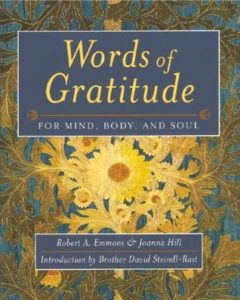Words of Gratitude for Mind, Body, and Soul [Hardcover]
 In a review over at SpiritualityandHealth.com, they said the following about this book:
In a review over at SpiritualityandHealth.com, they said the following about this book:
This handy resource will spur you…to living a life of unimpeded thankfulness.
There are times when gratitude comes over us as a wave, lifting us higher than we can normally stand, then setting us back down on our feet after bringing us closer to God, writes Robert A. Emmons and Joanna Hill. At other times it is our companion during our darkest moments, causing us to be grateful for the good in the midst of tragedy, encouraging us to believe that good can come even when we cannot understand our own suffering or the suffering of others.
Words of Gratitude for Mind, Body, and Soul by Robert A. Emmons and Joanna Hill (with an Introduction by Brother David Steindl-Rast) offers words of encouragement and guidance, proverbs, and prayers, interspersed with highlights of recent psychological research measuring the effects of gratitude. Why is it good to feel gratitude? Are there things we can do to pull ourselves out of a state of anger and loss? Can we choose gratitude? What are the hindrances to gratitude?
Clinical studies show that gratefulness builds and strengthens social bonds and friendships, while narcissism impedes the feeling of gratitude. Not only are those who practice gratitude happier, they are also healthier, exercise more frequently, and are more apt to be hopeful to others. Practicing gratitude does not buffer individuals from experiencing unpleasant emotional states.
“Gratitude is…more than a feeling, a virtue, or an experience; gratitude emerges as an attitude we can freely choose in order to create a better life for ourselves and for others,” explains Brother David Steindl-Rast. “The Nigerian Hausa put it this way: Give thanks for a little, and you will find a lot.” There is a paradoxical aspect to gratitude, Emmons and Hill point out: the more grateful we are, the more reasons we have to be grateful.
Lessons on cultivating gratitude come from most religious traditions. In Judaism, Christianity, and Islam, gratitude is essential to the religious experience. Psychologists are also looking at methods for helping people develop and experience gratitude. Emmons, who is a professor of psychology at the University of California, Davis, explains several methods of cultivating gratitude, ranging from a conscious psychological tool; to a personal, creative path of self-expression; to a focused, spiritual practice, such as the Buddhist meditation technique, Naikan. And prayers can help people experience gratitude.
Feeling gratitude, we attract goodness and good people into our lives; our gratitude turns into action. “Count your blessings and you will find them to be countless, even in the midst of adversity and tragic circumstances,” says Brother David.
Be Well.
Paul.
The Gratitude Guru